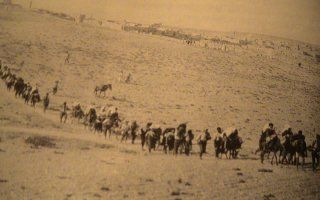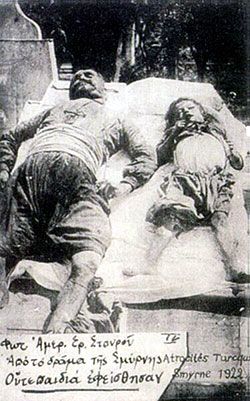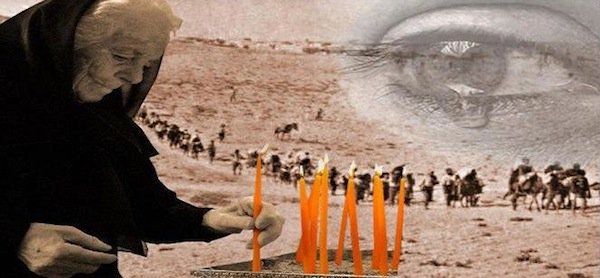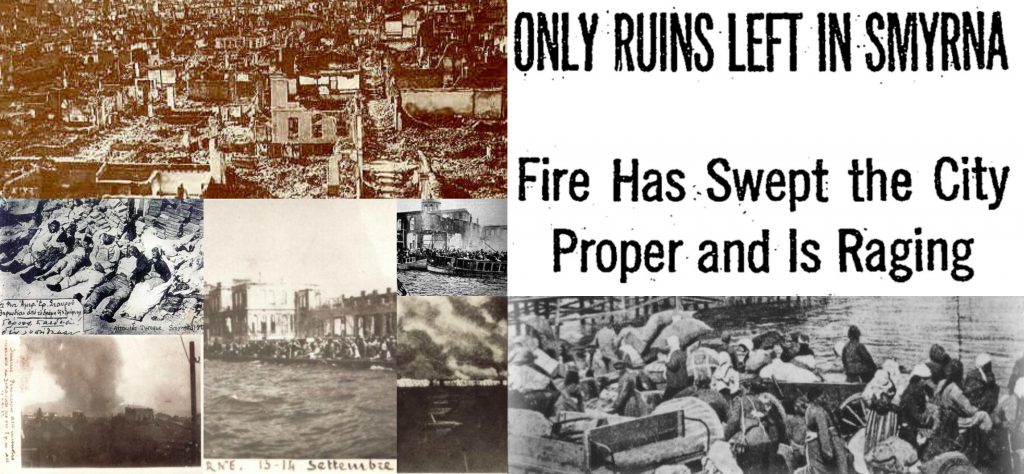
Views: 2396
The current Greek population in Turkey is estimated at fewer than 2,000. But this population decline was not due to natural causes; the Greek community has become nearly extinct due to many state-sponsored attacks and pressure.
The largest attacks took place during the last years of the Ottoman Empire with pogroms and discrimination continuing until the present day.
In 2007, the International Association of Genocide Scholars (IAGS) announced that “the Ottoman campaign against Christian minorities of the  Empire between 1914 and 1923 constituted a genocide against Armenians, Assyrians, and Pontian and Anatolian Greeks.”
Empire between 1914 and 1923 constituted a genocide against Armenians, Assyrians, and Pontian and Anatolian Greeks.”
The destruction of Greek heritage and institutions, including schools, continued after the Turkish republic was established in 1923. One tool to annihilate non-Turkish communities including Greeks was the so-called “Liberation Courts” that were set up in many Turkish cities.
“These courts,” writes the author Raffi Bedrosyan, “passed arbitrary decisions that almost invariably resulted in death sentences, with no defense or appeals allowed, and hangings carried out immediately. Among the victims of these courts were hundreds of Greek teachers in the American and Greek schools of the region, prominent community leaders, clergymen, and, tragically, entire members of the Merzifon Greek high school football team, only because the team was named Pontus Club, which was deemed sufficient reason to label them a rebel terrorist organization.”
Beginning on September 6, 1955, everything belonging to Greeks in Istanbul – homes, schools, offices, businesses, churches, cemeteries − was attacked by Muslim Turks. This pogrom greatly escalated Greek emigration from Turkey.
 Nine years later came the forced Greek expulsions. In 1964, as a result of tensions over Cyprus, Turkey broke its agreement with Greece and prohibited all commercial dealings by Greeks holding a Greek passport, leading thereby to the departure of at least 45,000 Greeks.
Nine years later came the forced Greek expulsions. In 1964, as a result of tensions over Cyprus, Turkey broke its agreement with Greece and prohibited all commercial dealings by Greeks holding a Greek passport, leading thereby to the departure of at least 45,000 Greeks.
In 1992 Helsinki Watch noted that “the Greeks were not allowed to sell their houses or property or to take money from their bank accounts.’’ They were forced to leave their birthplaces only with personal items weighing 20 kilos and money amounting to 20 dollars. According to the researcher Salih Erturan, the 1964 expulsion brought an end to Greeks of Istanbul.
Turkey’s Greek-speaking Orthodox citizens still cannot freely obtain education in their institutions. The Halki seminary in Istanbul, or the Theological School of Halki, the main theological school of the Ecumenical Patriarchate of Constantinople, was closed down by the Turkish state in 1971 and has not been reopened.
In addition, the Turkish government does not recognize the “Ecumenical” status of the Patriarch and Patriarchate, the spiritual center of the Eastern Orthodox Church.
The Allard K. Lowenstein International Human Rights Clinic of Yale Law School wrote in its legal analysis:
“Centuries of Turkish discrimination against and persecution of the Patriarchate and the Orthodox minority have been well documented… Turkey’s treatment of the Ecumenical Patriarchate and the Orthodox minority violates its obligations under international human rights law.”
The Turkish government has also confiscated much of the real estate belonging to Greek Orthodox Christians. “Many properties have been lost over the past few decades, such as office buildings, orphanages and other institutions,” said Walter Flick, a religious expert with the International Society for Human Rights in Germany, speaking to Deutsche Welle (DW), Germany’s international broadcaster.
The Buyuk Akinti Burnu Greek primary school in the Arnavutkoy district of Istanbul, for example, was restored and reopened in 2011 by the Bogazici University Alumni Association (BUMED) − but not as a Greek school. It was reopened as a Turkish kindergarten. The Greek primary school had been established in 1902 when there were still sizeable Greek communities in what was then called Constantinople, but was closed in 2009 due to a lack of Greek students, reported the Turkish Dogan News Agency (DHA).
In 2016, only 19 Greek students graduated from three Greek schools in Turkey, reported the weekly newspaper Agos. Yannis Demircioglu, the principal of the Greek Zografyan High School, said that for the last 21 years, “the number of graduates has been ranging between 19 and 27 every year.”
In the 1926-27 school year, there were 58 schools belonging to the Greek community in Turkey with 7213 students, 352 teachers and 222 administrators. Only five have survived, according to Demircioglu.
“The real problem is that we have a limited number of students,” the former representative of Minority Foundations, Laki Vingas, said.
“Founded in 1454, Fener Greek High School is one of the oldest education institutions in Europe, but it has fewer than 50 students now. This troubles the administration. It is the same with Zapyon and Zografyan… These schools are centuries old and the last remaining Greek communal institutions.
“Their situation is alarming. Istanbul was once a leading city in terms of education, not only for local Greek culture there, but also for Greek communities in all of Anatolia, Greece, and Balkans. This is a huge decline, and we are struggling to keep the schools open. This is the most worrisome issue for me.”
From Greek Asia Minor to 21st Century Turkey with a Dying Greek Community
Before Turks arrived in Asia Minor from Central Asia in the eleventh century, the indigenous population of the region spoke and wrote in Greek and was Greek Orthodox. Even the names of the region come from the Greek language such as “Anatolia” (from the Greek “Anatole,” “east” or “sunrise”) and “Asia Minor” (from the Greek “Mikra Asia,” little Asia).
However, the Greek cultural heritage in Turkey is on the verge of disappearing forever. Turkey is 99.8% Muslim today. As the researcher Tania Karas wrote, “One thousand, seven hundred Greeks left in a nation of 79 million… A century of oppression has nearly wiped out a religious minority group with historic ties to the region.”
The Republican People’s Party (CHP), which established the Turkish Republic in 1923 and ruled until 1950, stated in its 1946 report on minorities that its aim was to leave no Greek in Istanbul until the 500th anniversary of the 1453 “conquest” of Istanbul (1953).
It seems that their “dream” is about to come true.
Originally published on 2017-02-15
About the author: Uzay Bulut is a Turkish journalist formerly based in Ankara. She is presently in Washington, D.C. Follow her on Twitter at twitter.com/uzayb
Source: Clarion Project
Note by Vladislav B. Sotirovic:
Between the years 1914-1923 the Ottoman Empire instigated a violent campaign of persecution against its ethnic Greek minority. By 1923, upwards of 1 million Ottoman Greeks were victims to one of the first genocides of the 20th century. This campaign is known as the Greek Genocide. Visit: www.greek-genocide.net
Origins of images: Facebook, Twitter, Wikimedia, Wikipedia, Flickr, Google, Imageinjection & Pinterest.
Read our Disclaimer/Legal Statement!
Donate to Support Us
We would like to ask you to consider a small donation to help our team keep working. We accept no advertising and rely only on you, our readers, to keep us digging the truth on history, global politics and international relations.
FOLLOW US ON OUR SOCIAL PLATFORMS









